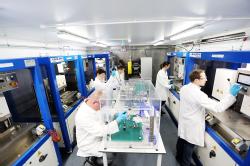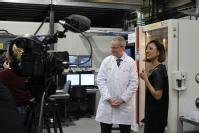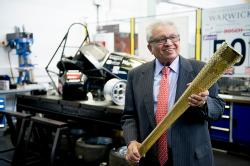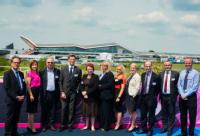WMG News
New Professor of Power Electronics Joins WMG
 WMG is proud to announce the arrival of Professor Richard McMahon who joins from Cambridge University.
WMG is proud to announce the arrival of Professor Richard McMahon who joins from Cambridge University.
As WMG’s first Professor of Power Electronics, Professor McMahon will set up and lead a power electronics research group widening WMG’s Energy and Electrical Systems research. He will bring with him his team from Cambridge, and a wealth of knowledge in power electronics, especially using wide band-gap devices, and their application in the automotive sector, energy use and storage, power distribution and renewable generation from both wind and wave power.
Professor McMahon comments: “Power electronics is a relatively new area of research for WMG, and I’m looking forward to using my expertise to help to grow and expand the existing Energy and Electrical Systems research.”
WMG plays key role in £20 million announcement backing British Automotive battery manufacturing
 WMG at the University of Warwick are delighted to be part of a £19.4m project to support the development of next-generation electric vehicle batteries in the UK, funded through the Advanced Propulsion Centre (APC UK Ltd).
WMG at the University of Warwick are delighted to be part of a £19.4m project to support the development of next-generation electric vehicle batteries in the UK, funded through the Advanced Propulsion Centre (APC UK Ltd).
The funding will support leading edge manufacturing research focussed around Nissan's Sunderland battery manufacturing plant - the largest full scale automotive Li-ion battery manufacturing facility in Europe. WMG researchers will play a key role in helping Nissan take forward this opportunity and will receive £1m for the research.
The consortium led by Nissan with WMG at the University of Warwick, Hyperdrive, Newcastle University, and Zero Carbon Futures (ZCF), will bring together engineers, researchers, new technology and existing facilities, assets and knowledge to create and prove new and improved manufacturing processes for the next generation of automotive batteries.
WMG has particular skills around battery chemistry and the manufacturing processes used to scale this up to high volume production. WMG role in the project will be to investigate potential improvements to battery chemistry and increasing manufacturing yield, and to optimise automated manufacturing processes to enable Nissan to remain at the forefront of electric vehicle technology.
Expert Comment: Professor Paul Jennings
 Professor of Experiential Engineering, Paul Jennings comments on US plans $4bn for self-driving rules.
Professor of Experiential Engineering, Paul Jennings comments on US plans $4bn for self-driving rules.
Self-driving, or autonomous, vehicle technology is developing at a rapid rate. Many of the world’s largest vehicle manufacturers are already unveiling self-driving car solutions and are being joined in the race by new players such as Google, Tesla and UK initiatives such as those by RDM Automotive LTD.
The need for a consistent set of regulations and international testing standards, as identified by the $4bn US DoT initiative for common rules, is critical in bringing self-driving cars to our roads. We know for example that current rules require the use of trained drivers for testing, but we have to consider how to engage end-users early on in the testing of self-driving vehicles. I believe these factors are key to increasing public acceptance and trust in autonomous driving technologies.
£180m Midlands investment as government confirms funding for the energy research accelerator
£60m of Government funding for the Energy Research Accelerator confirmed by Government in the Spending Review supported by a further £120m investment by industry and universities.
- Research will transform UK expertise in energy storage, thermal energy and energy efficiency.
- Six Midlands Innovation Universities and the British Geological Survey welcome £180m Midlands energy research endeavour.
- Industry investments from Blueprint, Cofely, Dearman Engines, Highview and Jaguar Land Rover.
The Government has today confirmed a £60 million capital investment in the Energy Research Accelerator (ERA). Together with private sector and university support the decision unlocks £180 million total investment in the Midlands region.
Today’s announcement has been welcomed by ERA’s leadership partnership, the six leading UK universities forming the Midlands Innovation group – The University of Warwick Aston University, The University of Birmingham, The University of Leicester, Loughborough University, The University of Nottingham - and the British Geological Survey.
WMG hiring 120 new positions over next 100 days
 The continued success and growth of WMG, at the University of Warwick, now means that it is seeking to hire 120 new recruits over the next 100 days.
The continued success and growth of WMG, at the University of Warwick, now means that it is seeking to hire 120 new recruits over the next 100 days.
WMG is a leading centre for world class education and applied research in many sectors including: automotive, aerospace and defence, business, construction, energy and utilities, IT, security and rail. They have recently won funding for several major research projects and partnerships that builds on our large array of collaborations with new and established partners.
WMG’s Chairman Professor Lord Kumar Bhattacharyya said:
As we continue to grow and expand we are seeking individuals who thrive on a challenge and who aren’t afraid to defy conventional thinking. We are investing in, and creating, several new world-leading facilities to support these new projects. So we also need to invest in more talented people to take these projects forward and we will intend to recruit 120 of those people in the next 100 days.”
Some of the most recent developments, at WMG include a new £13.5 million Energy Innovation Centre and the £150 million National Automotive Innovation Centre.
Warwick named as Electrical Energy Storage Spoke in £1 billion Advanced Propulsion Centre
 The University of Warwick has today been named as the "Electrical Energy Storage Spoke" of the government and industry funded £1 billion Advanced Propulsion Centre (APC), to co-ordinate a technical community with a shared interest in battery systems.
The University of Warwick has today been named as the "Electrical Energy Storage Spoke" of the government and industry funded £1 billion Advanced Propulsion Centre (APC), to co-ordinate a technical community with a shared interest in battery systems.
The Automotive Council has identified electrical energy storage as a key technology for the future of the automotive industry in the UK. WMG, at the University of Warwick, has made significant investments over the last 10 years to build expertise and facilities in the scale-up and evaluation of battery systems. As a result of these investments, and a strong network of academic and industrial partners, The University of Warwick has been identified as the logical location to host the Electrical Energy Storage Spoke for the APC.
Fully Charged for Christmas
 Battery experts at WMG, University of Warwick have helped The One Show test AA batteries to determine which last the longest.
Battery experts at WMG, University of Warwick have helped The One Show test AA batteries to determine which last the longest.
More used to testing batteries for transport, including cars, trains and motorsport as it’s Christmas experts were more than happy to help reporter, Anita Rani with a scientific test to understand how a range of different AA batteries available on the high street might perform. The tests were carried out in WMG’s Energy Innovation Centre using the battery characterisation laboratory and part of the £13m Battery Materials Scale-Up Pilot Line.
Mark Amor-Segan, Principal Engineer and Shane Beattie, Technical Manager, for the Battery Scale-up Facility, conducted blind scientific tests on 16 different AA batteries. The batteries came from three different battery chemistry families: i) zinc-chloride, ii) alkaline and iii) lithium. All 16 batteries were tested at a constant current of 500 mA down to 1.1 V. The voltage profile was recorded using a highly accurate battery cycler. All batteries were kept at 20 degrees using a thermal chamber to provide a controlled test environment. For The One Show viewers Anita came armed with 16 toy puppies and fitted each with the 16 different types of batteries. Keeping the puppies in a 20 degree room, the same temperature used to test the batteries, and watched over by a researcher, they were set off to see which would last the longest.
Christmas gift reveals secret story of how UK car technology was used to create Olympic torch
 On Wednesday 10th December Coventry company Premier Group are to present a gift of an Olympic torch to Professor Lord Bhattacharyya Chairman of WMG at the University of Warwick revealing the secret story of how leading edge UK car manufacturing technology was used to create the torch.
On Wednesday 10th December Coventry company Premier Group are to present a gift of an Olympic torch to Professor Lord Bhattacharyya Chairman of WMG at the University of Warwick revealing the secret story of how leading edge UK car manufacturing technology was used to create the torch.
Automotive companies are constantly looking for new high tech alloys and metals to make vehicles greener by reducing weight while retaining strength. Companies such as Premier Group who supply metal vehicle components need to quickly find new ways of working with shaping, welding and bonding these new materials if they are new to meet their customers evolving needs and in Premier Group’s case it turns to WMG for the manufacturing technology it needs.
When Premier Group received the contract to supply the 2012 Olympic torch it immediately faced a very familiar problem - an ambitious design using lightweight materials that would aid the runner carrying the torch but challenge the manufacturer creating it. As ever it was WMG who solved this problem, and they did so without charge as WMG’s contribution to a successful Olympics.
WMG takes part in key Silverstone event
 WMG has taken part in a high profile event attended by global leaders in the engineering industry aimed at promoting cutting-edge technology and celebrating 50 years of the Grand Prix at Silverstone.
WMG has taken part in a high profile event attended by global leaders in the engineering industry aimed at promoting cutting-edge technology and celebrating 50 years of the Grand Prix at Silverstone.
Coventry and Warwickshire Local Enterprise Partnership (CWLEP) was among the partners of the ‘Driving Technological Change within British Manufacturing’ event in the build-up to the British Grand Prix last weekend.
Around 240 delegates attended the one-day event which attracted industry leaders and organisations to discuss a wide range of topics in a series of seminars and question and answer panels.
Mark Amor-Segan, Principal Engineer within the Energy & Electrical Systems team at WMG, facilitated a seminar on Energy Capture and Storage, focusing on the electrification of vehicles within motorsport and automotive, looking at optimum configurations to achieve best performance. The session also included Sylvain Filippi, Chief Technical Officer for the Virgin Racing Formula E Team and Paul Bostock, Senior Manager, Hybrids and Electrification at Jaguar Land Rover.
Consortium Awarded £1m R&D funding from TSB call on Fuel Cell Manufacturing
WMG centre HVM Catapult is pleased to announce that a consortium led by London-based fuel cell company, Arcola Energy, has been awarded £1m R&D funding from the recent TSB call on Fuel Cell Manufacturing. Arcola Energy, the lead partner on the bid, is working within the UK to build up a strong fuel cell supply chain and manufacturing base. They are focussed on portable and small scale automotive applications. Other partners in the consortium are Imperial College and Lohmann Tapes.
Professor Robert Harrison’s team at WMG will focus on the application of manufacturing process modelling to fuel cells. The work will leverage WMG’s extensive in-house battery manufacturing and automation systems knowledge. It is anticipated that current fuel cell lifetime limitations and high unit costs that result from immature manufacturing processes will be addressed through this research by the application of automated processes and improved quality control.
The project will also work on developing a UK supply chain to support UK manufacturing of fuel cells. Professor Jan Godsell’s team at WMG will be involved in this activity.
Interest in fuel cell technology is increasing steadily from sectors such as automotive and stationary power. It is expected that growing demand will drive up production volumes by two orders of magnitude over the next five years, further reducing costs.
